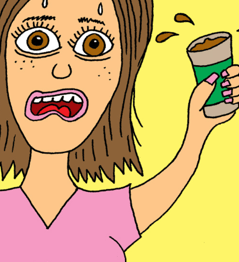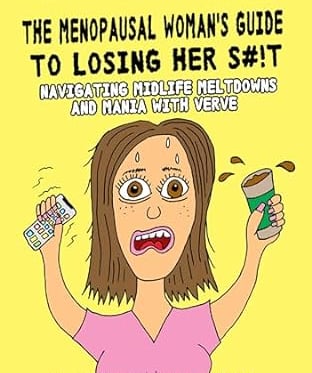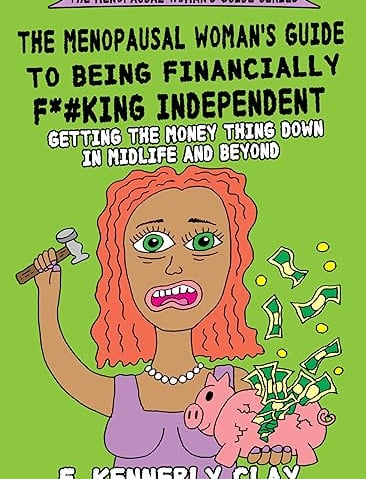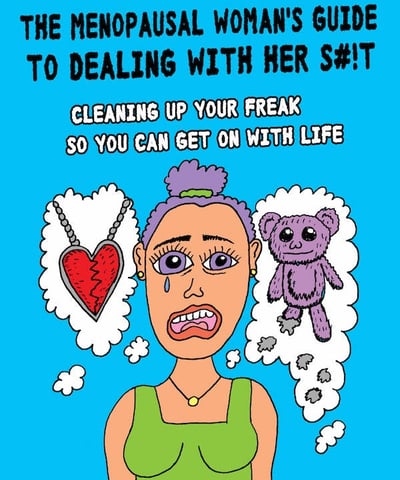Best Depression Meds for Menopause (without the Weight Gain)
Discover the best depression medication for menopause, plus potential side effects and holistic strategies to reclaim your mental health.
MENOPAUSAL DEPRESSION
Kennerly Clay
11/24/20245 min read


Menopause can be a challenging time, and for many women, it triggers a whole 'nother shitshow: depression. Research shows that hormonal fluctuations during this transition can significantly increase the risk of mood disorders. In fact, women are two to four times more likely to experience depression during perimenopause and early menopause compared to other life stages.
So, if you're feeling down, know that this is a common struggle. Keep in mind, depression and associated menopausal symptoms often require a multi-pronged approach, and there is no one-size-fits-all solution for this complicated stage of life. Incorporating medication is just one effective way of coping with depression in menopause.
If you or someone you know is in crisis, please call 988, the Suicide & Crisis Lifeline in the United States.
What is the best depression med for menopause?
When it comes to treating depression related to menopause, two main classes of antidepressants often come into play: Selective Serotonin Reuptake Inhibitors (SSRIs) and Serotonin-Norepinephrine Reuptake Inhibitors (SNRIs). Let's break down what each of these entails, along with their potential side effects and benefits.
SSRIs: The tried-and-true options
SSRIs are widely prescribed and have a solid track record. Here are some common choices:
Paroxetine (Paxil) - Not only effective for mood stabilization but also FDA-approved for managing hot flashes. However, it's more likely to cause weight gain compared to other SSRIs.
Escitalopram (Lexapro) - Known for its efficacy in treating both anxiety and depression. It has a lower risk of weight gain compared to some other options.
Citalopram (Celexa) - A reliable option that can help alleviate depressive symptoms, but it's associated with weight gain.
Fluoxetine (Prozac) - Not associated with higher odds of weight gain compared to sertraline, making it a potentially good choice for weight-conscious women.
SNRIs: The newer contenders
SNRIs have gained attention for their effectiveness in treating menopausal depression:
Venlafaxine (Effexor) - Research suggests it may be particularly effective for postmenopausal women dealing with depression. It's not associated with higher odds of weight gain compared to sertraline.
Desvenlafaxine (Pristiq) - Similar to venlafaxine, it offers a robust option for managing depressive symptoms without significant weight gain concerns.
Other options worth mentioning
Bupropion (Wellbutrin) - While not specifically an SSRI or SNRI, it's associated with slight weight loss in the short term, making it an attractive option for some women.
Mirtazapine - While effective for depression, it's associated with significant weight gain, especially in the first four weeks. However, it's sometimes prescribed off-label to stimulate appetite in seriously ill patients.
Menopause survival tip sheet
The Menopause Madness Relief Kit is a hand-curated list of menopausal survival tips from women who've been to hell and back.


What the research says
A study published in BMC Psychiatry (2019) found that venlafaxine outperformed traditional SSRIs like fluoxetine in treating postmenopausal depression. This suggests that SNRIs might be a preferred option for many women navigating this phase of life. However, it's essential to remember that individual responses can vary widely.
Important considerations
Choosing the right antidepressant isn't just about picking a name off a list. Here are some critical factors to discuss with your healthcare provider:
Medical history - Your past health issues can influence which medication is best for you.
Medication interactions - If you're taking other medications, some antidepressants may not be suitable. This is especially important with MAOIs, which have a major risk of drug interactions.
Specific symptoms - Different medications target different symptoms, so your unique experience matters.
Side effects - Understanding potential side effects is crucial in making an informed decision. For instance, tricyclic antidepressants are more likely to cause serious side effects, while some antipsychotics (sometimes used for depression) can impair glucose metabolism and increase cholesterol and triglyceride levels.
Weight concerns - If weight gain is a significant concern, medications like fluoxetine, venlafaxine, or bupropion might be preferable to options like paroxetine or mirtazapine.
A holistic approach to treatment
While medication can play a significant role in managing depression, it's not the only tool in your toolbox. Consider integrating other strategies into your routine:
Regular exercise - Physical activity is proven to boost mood and overall well-being.
Balanced diet - Nutritional choices can impact your mental health; aim for whole foods rich in omega-3 fatty acids and antioxidants.
Stress management techniques - Mindfulness, meditation, or yoga can help alleviate symptoms.
Sleep hygiene - Prioritizing good sleep practices can significantly improve mood stability. Some medications, like trazodone, are used off-label for insomnia treatment.
Psychedelic medicine - While the jury may still be out on this one and there’s still a lot of research to come, some women find relief from menopausal symptoms with therapies such as CBD or ketamine therapy for depression.
Explore more about menopause mood swings and how to cope.
Collaborate with your healthcare provider
Ultimately, no single medication is right for every woman experiencing menopausal depression. It's crucial to have an open dialogue with your healthcare provider about your symptoms, concerns (such as weight gain), and treatment options. They can help tailor a plan that suits your needs and lifestyle.
Navigating menopause-related depression can be tough, but with the right support and treatment plan, you can find relief. Remember, you're not alone in this journey—many women are facing similar challenges, and together we can work towards better mental health during this transitional phase.
The information provided in this blog post is for educational purposes only and should not be considered medical advice. Every individual's situation is unique, and what works for one person may not be suitable for another. Always consult with a qualified healthcare provider before making any changes to your treatment plan or starting new medications. Your healthcare provider can take into account your personal medical history, current health status, and other individual factors to determine the most appropriate course of action for your specific needs.
Wanna connect further on depression meds in menopause?
About the author
Kennerly Clay is the author of The Menopausal Woman's Guide series, a snarky trilogy for women who are losing their shit in peri/menopause. Her focus is on all things mental health, financial health, and personal growth during the menopausal years.
Books for women who are losing it in menopause
Mental Health
Losing your mind in peri/menopause?
The menopausal woman's guide series
Financial Health
Had enough of financial insanity?
Personal Growth
Triggers? Old stuff kicking up?
Related topics
Explore helpful articles, tips, and advice for women who are losing their shit in menopause.
Community
Stay Connected
© 2024. Eclectic Content, Inc. All rights reserved.








